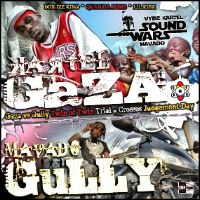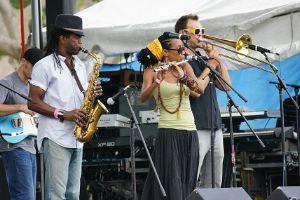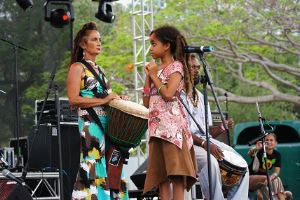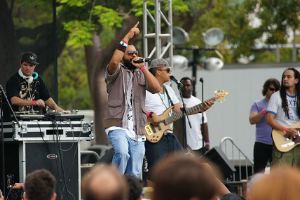Reggae Back to its Roots
May 13, 2011 • By Breanna Chevolleau
 These
days, when people think of reggae music the first thing that comes to
mind is the new wave of dancehall music that has taken center stage.
Artists like Vybz Kartel and Mavado have captivated a new audience with
their explicit lyrics and controversial lifestyles.
These
days, when people think of reggae music the first thing that comes to
mind is the new wave of dancehall music that has taken center stage.
Artists like Vybz Kartel and Mavado have captivated a new audience with
their explicit lyrics and controversial lifestyles. But, on April 30, Rockaz Movement reminded people what reggae music is all about with the free Miami Reggae Festival at Peacock Park in Coconut Grove, Florida designed to help solve hunger and homelessness in Miami-Dade County.
Considering the 8,000 people who attended, the $5000 collected, and the 2 and a half tons of canned goods that will all be distributed to the needy, it's safe to say that the event was beyond successful.
With the violence that constantly engulfs today's society, it is more important now than ever that the real message of reggae music be spread across not only the Caribbean, but the whole world.
Take Jamaica - the island where the musical movement was birthed. Dancehall artists are divided into two groups popularly known as "Gaza" and "Gully."
Violent robberies, shootouts and miscellaneous crimes are all results of a feud that has developed between these groups over the past decade.
What's worse than people of the same culture killing each other, artists who are supposed to provide inspiration are adding to the problem.
Two of today's biggest dancehall artists, Vybz Kartel and Mavado, are widely known members of the two groups -- Kartel being part of "Gaza," and Mavado a part of "Gully."

In the face of such violence, it was even more timely for Rockaz Movement to host an event such as this, reminding people of the peaceful "vibes" that should emanate from reggae.
Festival-goers were refreshed to be in an atmosphere where "One Love" was the only thing on everyone's minds. Of course, there are concerts like "Best of the Best," held yearly in Miami that feature some of the top reggae artists like Damian Marley, Tarrus Riley and Vybz himself.
But, this one was different.
The show wasn't about its headliners Morgan Heritage, the sizzling jerk chicken on the grill or even the steel pans and jamming bass lines. It was a humanitarian effort to raise money, food, and awareness for a charity called Curley's House.
There was no admission fee. A minimum of two canned goods was the only requirement for festival-goers to enjoy the show.
These two small cans, multiplied by the thousands in attendance, will impact Miami's underprivileged families who suffer from hunger, malnutrition and homelessness. Curley's House fights to end hunger in the low-income communities of Liberty City, Allapattah, Brownsville, Little Haiti, and West Little River.
 Additionally,
Curley's House aims to improve the lives of people suffering from not
only starvation and homelessness, but abuse, HIV and other hardships.
Additionally,
Curley's House aims to improve the lives of people suffering from not
only starvation and homelessness, but abuse, HIV and other hardships. For those who participated, this cause was a reminder of the real roots of reggae: to promote brotherly love and caring for one another.
Started in the 1960's in Jamaica, reggae was born out of ska and rocksteady music. Ska, composed of a walking bass line, piano or guitar, and jazz-like horns, was very popular with the Jamaican "rude boy" sub-culture.
Reggae was pioneered by artist Bunny Lee. However, the group, The Wailers, featuring Bob Marley is the most recognized. These artists spoke of returning to "Zion" or the motherland of Africa and fighting oppression.
This should not only be taken literally, but should also be translated into solutions for our modern day problems. Instead of oppressing ourselves through violence and killing, artists like Bob Marley encouraged audiences to "get up, stand up, stand up for your rights."
The Miami Reggae Festival was a reminder that society needs to stand up once again.
"I am ecstatic over the success of the Miami Reggae Festival!" said concert producer Alfonso D’Niscio Brooks in a post-event press release. "I feel really good not only about the stellar concert we presented but also the outpouring of charity that South Florida demonstrated. This spirit of giving is a reflection of the positive message reggae music sends to its audience.”
After donating to Curley's House, the participants could feel this spirit of reggae all around, as if they had a purpose for which to groove. And once the music started, the festival was taken to a whole new level.
As the artists successfully boosted the message of harmony and the need to return to the real roots of reggae, the audience - a multi-colored mix of people - were whipped into frenzied agreement. It wasn't only Jamaican or even West Indian people who came to enjoy the sounds of reggae, but there were people from every race represented.
Whether White, Latino, Asian or Black, everyone moved to the same beat.
This diversity was also reflected in the artists chosen to perform.
 Some
of Miami's local artists like Ephniko, Jahfe and The Jungle all hit the
stage performing original songs of peace, love and unity.
Some
of Miami's local artists like Ephniko, Jahfe and The Jungle all hit the
stage performing original songs of peace, love and unity. As a Colombian songwriter, recording artist, and emcee living in Miami, Ephniko graced the stage with his eclectic but gritty style of music which is said to have the "centricity of 90s hip hop." His trademark lyrics discussed the stories of immigrants and poetically painted the picture of today's times.
Multi-cultural group, Jahfe, captured the audience's attention with an amazing upbeat performance. Their music, unlike any other group's, featured a mixture of reggae, hip-hop, r&b and rock. It was no surprise that Jahfe's music spoke of injustices across the globe because their members came from a wide spectrum of countries, including Spain, Israel, Cuba and Morocco.
The Jungle, a group made up of Liberian rapper Sekajipo and singer Souljourner, performed a song called "Hard Times" from their album Revolution of the Mind-State.
Ironically, its lyrics represented much of the spirit of brotherhood that characterized the whole festival:
"Hard times are all you ever seen, don't cry, you can call on me. Hard times. I'll be there for you. Hard times. We will make it through."
When Soulflower, affectionately named the Empress of hip-hop, took the stage it was also a memorable moment. Upon her entrance, it was clear from her attire that she was deeply in touch with her African roots. Her dreadlocks were partially tied up, yet still hung all the way down her side.
Soulflower began her performance with, not a song, but a solo poetic recitation that said: "I am representing divinity, hailing from the heavenlies, the oneness and the unity. I am..."
 "My
goal is to get rid of gender imbalances in society by empowering women
and being an example of a leader and not a follower," Soulflower told
NEWDmagazine.com after her performance.
"My
goal is to get rid of gender imbalances in society by empowering women
and being an example of a leader and not a follower," Soulflower told
NEWDmagazine.com after her performance.All in all, the two biggest performances of the night were Puerto Rican band Cultura Profetica and family band Morgan Heritage.
When Cultura Profetica took the stage at 10 p.m., everyone moved closer as the group sung their Spanish melodies backed up by a familiar bass line. Their songs, "Un deso,” "Illegal,” "Baja la tension” and "Ritmos pa seducer” provided a taste of something new, as they were sung purely in Spanish. However, one language everyone could recognize was Cultura Profetica's sound composed of basic reggae "seasoned with touches of jazz, salsa,... Brazilian music, [and]... Afro-Caribbean roots."
Last up was Morgan Heritage, a band made up of a close-knit biological family.
Gramps, a member of the group, has said that being family is a blessing because "you can hear the chemistry between us." Whether it's chemistry, the rhythms, or the lyrics, its clear that Morgan Heritage has something going for them.
They have produced seven albums including their most recent project, Full Circle.
Before performing their classic hit, lead singer Peetah (Peter) Morgan said passionately from the mike: "Know that all you're about to hear is good reggae music, music of love, music for all people...We know a lot of people don't like reggae music, but without the roots you have no fruits; reggae music lives forever."
With such a cause, to say the least, Morgan Heritage said it best: "Reggae music [will] live forever."
Related Articles · More Articles
The public charge rule that rendered immigrants inadmissible or ineligible for green cards if they accept government assistance was overturned in September and new rule, allowing immigrants to receive food stamps, healthcare services and other government aid, took effect December 23, 2022.
This Christmas, R&B singer-writer-producer Ne-Yo, stars in the BET+ original holiday remake of “The Sound of Music" directed by Booker Mattison.
Trump is like an aging boxer well past his prime, who does not know when to quit. Yet, which political stands in the wings? I think we all know.

